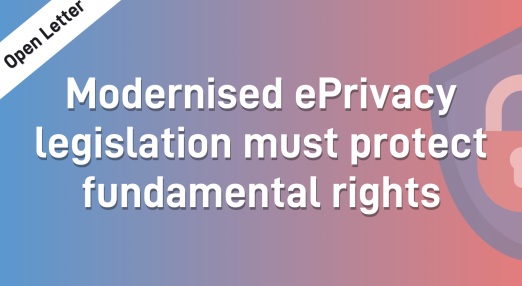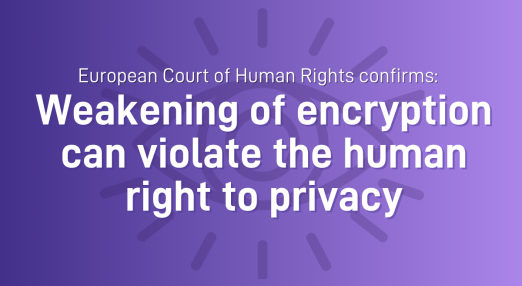Reopening GDPR and ePrivacy through the Digital Omnibus: a risky path for EU digital rights
EDRi has assessed the Digital Omnibus proposals affecting the General Data Protection Regulation (GDPR) and the ePrivacy framework. While presented as simplification, the changes amount to deregulation in effect, weakening fundamental rights safeguards, increasing legal uncertainty, and advancing through a process that falls short of democratic lawmaking standards.
Filter resources
-

Reopening GDPR and ePrivacy through the Digital Omnibus: a risky path for EU digital rights
EDRi has assessed the Digital Omnibus proposals affecting the General Data Protection Regulation (GDPR) and the ePrivacy framework. While presented as simplification, the changes amount to deregulation in effect, weakening fundamental rights safeguards, increasing legal uncertainty, and advancing through a process that falls short of democratic lawmaking standards.
Read more
-

When data relate to us
The EDPS vs. Single Resolution Board judgment goes to the heart of the EU’s fundamental right to data protection, shaping how artificial intelligence, data spaces and so-called privacy-enhancing technologies (PETs) will be governed in practice. The ruling of the Court of Justice of the European Union (CJEU) arrives at a crucial time to reiterate what counts as personal data, reinforcing the importance of the protection that the GDPR was designed to guarantee.
Read more
-

Press Release: Commission’s Digital Omnibus is a major rollback of EU digital protections
Today the European Commission has published two Digital Omnibus proposals, reopening the EU’s core protections against harm in the digital age. This step risks dismantling the rules-based system that was hard-won over decades, endangering the very foundation of human rights and tech policy in the EU.
Read more
-

Panoptykon Foundation challenges the data retention regime in Poland: Telecom companies requested to delete activists’ data
EDRi member Panoptykon Foundation supports activists and attorney-at-law Artur Kula to demand that the four biggest telecom companies in Poland delete data stored for the purpose of law enforcement in the 12 months prior. They want to challenge the current unlawful data retention regime in Poland.
Read more
-

The ePrivacy Regulation proposal has been withdrawn, but the fight for your privacy is far from over
The European Commission's withdrawal of the ePrivacy Regulation proposal is a major setback for privacy rights in Europe, driven by pressure from industry interests and national security concerns. However, EDRi remains committed to advocating for stronger privacy protections, challenging commercial and state surveillance in future legislative efforts.
Read more
-

Unpacking digital fairness: What Europe must do now to end the tech industry’s most nefarious tactics
The EU plans to propose a Digital Fairness Act to better protect consumers from deceptive design practices, social media addiction, and pervasive online tracking. We unpack what this means and what the European Commission should do to end Big Tech’s most nefarious tactics.
Read more
-

Open letter: Modernised ePrivacy legislation must protect fundamental rights
Today, 24 April, EDRi and 13 organisations call for robust legislation to complement and particularise the General Data Protection Regulation (GDPR), and call upon the next European Commission to include comprehensive plans for reforming the European Union’s ePrivacy legislation.
Read more
-

European Court of Human Rights confirms: weakening of encryption can violate the human right to privacy
In a milestone judgment - Podchasov v. Russia - the European Court of Human Rights (ECtHR) has ruled that weakening of encryption can lead to general and indiscriminate surveillance of the communications of all users and violates the human right to privacy.
Read more
-

Do you trust the police? CJEU Advocate General accepts access to phones for any type of crime
In its opinion on the Bezirkshauptmannschaft Landeck case, the Advocate General of the European Court of Justice is failing to suggest adequate safeguards for police access to our smartphones.
Read more
-

2023: Important consultations for your Digital Rights!
Public consultations are an opportunity to influence future legislation at an early stage, in the European Union and beyond. They are your opportunity to help shaping a brighter future for digital rights, such as your right to a private life, data protection, or your freedom of opinion and expression.
Read more
-

PEGA hearing about spyware and ePrivacy
Following the public revelations of the widespread use of Pegasus and other spyware, the European Parliament formed the Committee of Inquiry to investigate the use of Pegasus and equivalent surveillance spyware (PEGA) in March 2022.
Read more
-

Chat control: 10 principles to defend children in the digital age
The automated scanning of everyone’s private communications, all of the time, constitutes a disproportionate interference with the very essence of the fundamental right to privacy. It can constitute a form of undemocratic mass surveillance, and can have severe and unjustified repercussions on many other fundamental rights and freedoms, too.
Read more
